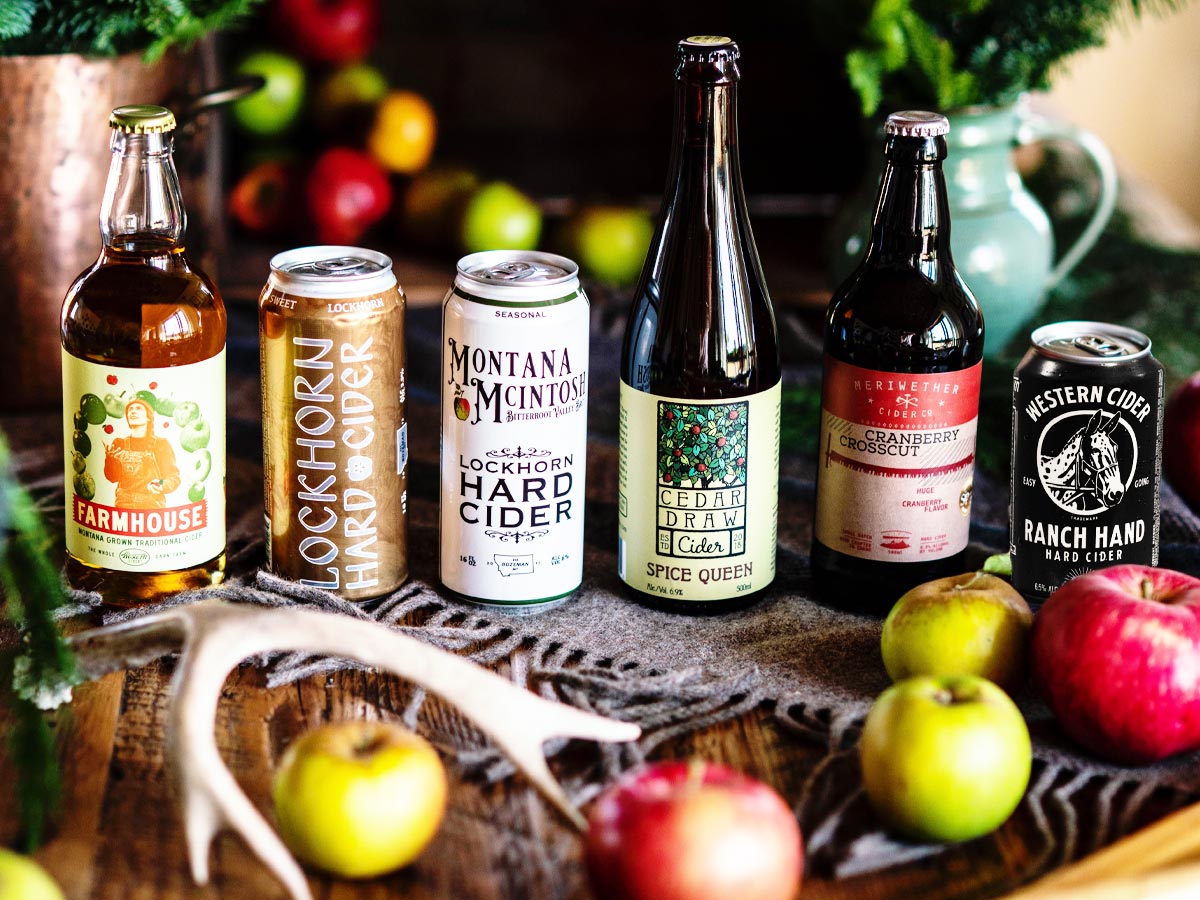By Dianna Troyer
Questions swirl through Gig Leadbetter’s mind every time he sips a sample of a golden hard cider he has crafted for his family’s business, Meriwether Cider Co., in Idaho’s Treasure Valley.
Is it ready for their tasting rooms in Garden City where customers select from 13 taps or their Cider House in Boise with 20 taps?
“When tasting a new batch, I look at color and clarity,” said Leadbetter, head cider maker. “Next, I swirl for aroma and then taste. In taste, I look for a balance of ingredients and a balance between sweet and tart (acid). Mouth-feel and the lingering aftertaste also play a role before calling it a go.”
Since opening the cidery in 2016, Leadbetter has perfected proprietary recipes for hard ciders that have won more than two dozen awards at contests nationwide, including the Great Lakes International Cider and Perry Competition.
“Cider-making is my passion,” he said. “I smell it, watch it, taste it, and develop it daily.”
He combines countless variations of ingredients—diverse juices from apples and cherries to cranberries and quince, with assorted types of yeasts—applying different fermentation times.
Meriwether Cider is among nearly two dozen hard cideries in Idaho and Montana with tap rooms featuring international imports and prize-winning, artisanal beverages made from locally harvested fruit. Their tasting rooms are convivial places where multi-generations of families often gather.
Both states are part of a blossoming trend in hard cider consumption. Last year, nationwide sales increased 11 percent and amounted to $494.4 million, according to Chicago-based Information Resources Inc.
Hard ciders sales are surging because devotees crave a gluten free, low-alcoholic beverage with no added sugar or preservatives, like sulfites. Sometimes infused with spices and herbs, hard cider flavors are as infinite as their makers’ imaginations.
To celebrate Christmas and New Year’s, the cidaries make festive holiday ciders. Justin Simms, another cider maker at Meriwether, developed a pumpkin cider with holiday spices named, … And Everything Nice.
Not only during the Christmas season, but year-round, many cider makers are committed to philanthropy and donate to local nonprofits. Meriwether’s program, Let’s Do Good, raises funds and awareness for different organizations and their missions.
To keep up with steadily increasing demand, Leadbetter makes about 35,000 gallons of cider annually. His experiences with home-brewing beer helped him transition to cider.
“Controlling fermentation transferred over to my cider-making, which also took years of experimentation, failures, and successes,” he said. “At times, I’ve had a half dozen 5-gallon buckets fermenting at different temperatures with different yeasts and juices.”
Leadbetter and his wife, Ann, became entrepreneurs at a time in their lives when most people would consider retiring. They had been firefighters, outdoor enthusiasts and world travelers, and most recently college professors for two decades. Their last jobs were at Colorado Mesa University, where Gig taught kinesiology while Ann’s subject was English.
When they retired from academia, their adult daughters, Kate and Molly, who had also worked as firefighters, joined them in the family enterprise. They named their latest adventure for explorer Meriwether Lewis, a distant relative of Ann’s.
“There is no such thing as retirement as long as you’re passionate and engaged in any activity,” Leadbetter said. “I may retire from a particular activity, but there’s always another to take its place. I’m 66 and try to live a healthy life and will continue to live rather than simply exist.”
To describe their ciders, the Leadbetters brainstorm and pick names that are as entertaining as their recipes. Cherry Thyme Bomb is tart and sweet and steeped in thyme. Wake Up and Dance is a semi-dry cider made with lemon and a blend of black tea, to provide caffeinated energy. Aged in a gin barrel for six months, Dry Humor is tart and oaky with hints of cardamom and juniper.
The Leadbetters’ timing to make and sell cider was ideal despite closures of tasting rooms due to the coronavirus pandemic.
“Cider is the only craft beverage in the Pacific Northwest that grew in the last year, other than hard seltzer, which some craft brands make,” said Emily Ritchie, executive director of the nonprofit Northwest Cider Association that has more than 100 regional members.
“It’s been a tough go of it the past 18 months, so we’re incredibly happy to see these small businesses continue to make it through these challenging times,” Ritchie said.
With hard cider rising rapidly in popularity, in 2020 the association launched a monthly sampler club for subscribers.
The association’s December Discover Box features six samples from Montana and Idaho, including Meriwether’s Cranberry Crosscut and Spice Queen, an apple cider from Cedar Draw Cider near Buhl, Idaho. Selected Montana ciders are Lockhorn Hard Cider, Montana McIntosh and Farmhouse Traditional.
Montana’s holiday ciders and gifts to communities
Apples have been at the core of Bud and Jennifer Desmul’s lives since 2006 when they began planting an orchard on their land near Kalispell. They expanded steadily and now care for 7,000 trees with 20 apple varieties and 10 pear varieties.
“It’s been gratifying for us because we wanted to grow unique varieties that were unavailable locally,” Jennifer said. “We’ve been providing fresh fruit for our friends since then. We ended up with a lot of apples and decided that converting our extra apples to hard cider was the most efficient and sustainable way to use our fruit.”
While the trees were maturing, they envisioned eventually opening Big Mountain Ciderworks—a dream that became reality last year and is a family labor of love with their sons, Jack, Ben, and Beau.
“We also wanted to start Big Mountain Ciderworks to create a legacy for our sons and jobs, so they could return to the valley,” said Jennifer, 54.
In 2020, they opened a full service restaurant and tasting room, which has 10 ciders on tap.
For the holidays, they craft Snow Devil, a cider with a hint of cinnamon. They also make a champagne-like special reserve made out of pears, named Perry. Other ciders have hints of cherry and pineapple.
Their ciders are also available in grocery stores throughout the Flathead Valley.
To thank the community for their support, the Desmuls donate to local nonprofits, including a suicide prevention program, Halt Cancer at X, and the Great Bear Festival, a summer celebration.
Lockhorn Cider
For the holidays, Glen and Anna Deal make several specialty ciders at Lockhorn Cider House in Bozeman. They include Pumpkin Spice, Winter Warmer Iced Cider, Cranberry Solstice, and Tangerine Mimosa for New Year’s Eve.
Their ciders made from McIntosh apples were selected for the Northwest Cider Association’s Big Sky Country Cider Club’s December sampler.
“We’re thrilled to be a part of the sampler but weren’t surprised to be included, especially with our 100-percent Montana grown heirloom McIntosh cider,” Anna said. “We’re Montana’s second oldest cidery and have developed a distinct reputation for high quality ciders.”
Their interest in hard cider was prompted when Anna was diagnosed with gluten intolerance and was unable to drink beer because of their malted grains and sulfite preservatives.
Seeking an alternative, the Deals decided to make their own hard cider and predicted it would become increasingly popular with people wanting a low-alcoholic beverage other than beer.
In 2012, they remodeled an historic farmhouse garage into their cider house.
They named their business for a set of antlers that became entangled when two bull moose were sparring during the rut. The antlers were found in their home state of Alaska by a long-time friend long before they started the business.
“It inspired the name “Lockhorn” for the tragically beautiful outcome,” Anna said.
The skulls with the locked antlers hang on the wall in their tasting room.
They also built an outdoor patio and fireplace and planted a garden of more than 200 native wildflowers, grasses, and trees.
“We wanted to create a comfortable, welcoming family-friendly tasting room,” Anna said.
A few years later they planted an orchard.
“Our goal is to supplement our supply of apples with Montana grown fruit. We source apples from the Northwest and as much as we can from Montana. Our Montana McIntosh Cider, Flathead Cherry Cider, and Bozeman Backyard Blend Ciders are proudly Montana grown.”
The Deals offer a non-alcoholic fresh pressed local cider as well as alcoholic and non-alcoholic cider, served hot with select spices.
One of their most popular ciders is the Bozeman Backyard Blend, made with donated apples from local residents. Donors receive a free can of cider for every 25 pounds they provide. This fall, the Deals collected 5,000 pounds.
They donate a portion of profits from this community-grown cider to the Bozeman Symphony, Gallatin Watershed Council, and Haven, a women’s shelter.
Cider’s Comeback
After tasting a sample, Leadbetter was satisfied another batch of cider was ready for the tap. He noted hard cider was historically a cultural mainstay in the United States.
“By the 18th century, Americans in New England were fermenting 300,000 gallons of cider a year, but by the end of Prohibition, hard cider had almost vanished,” he said. “It has definitely made a comeback and is here to stay.” MSN









